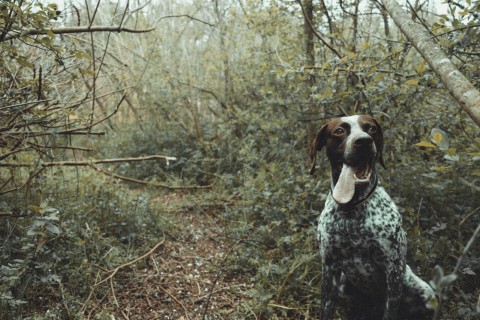In late summer the tree trail is far better than the shore trail, due to algae in the lake. If the dogs know they’re near water, they’ll turn otter. Don’t let them in there, say city people who own cottages that are better than our year-round houses. Cyanobacteria. A microcystin will get into their bile acid transport systems like a bank robber who runs like hell for ten blocks, then steps onto a bus, about to spend the afternoon on D & D in the park. The city people like to keep an eye on their livers. As if they are their wallets.
The dogs and I are not afraid of anitoxins and saxitoxins. We don’t think the green scum on the lake is all that toxic, though the freshwater phytoplankton run riot through our hair. You can swirl your hand in the surface and it will open up clear, a window into the water. It’s just the lake turning over and cleaning itself, is what the fishing guides say, and some of them are fifth or sixth generation. But later the phytoplankton will start to rot, and the dogs and I will smell like a rigged election.
So instead, we’re in the trees. The dogs want to hunt. However, starlings or grackles, tattletales, fly ahead of them warning DOG, and the most they can do is bark, sniff, or growl. I mean, the most the dogs can do. Barking comes off differently in birds. The trees laugh at what trouble we bring to them, anyway.
The dogs want to ravage something, but I want to spread and leaf out. I am getting old, and I haven’t yet bothered to take root. A wind is falling down on us in layers like flattened, stacked breath. The dogs twitch it off; I’m wishing I could sieve between the layers. Autumn is stored in there somewhere, then winter after that. I want to rummage in them and just take what I need. The trees find this funny, too.
A blur behind a birch becomes a porcupine, and the dogs think they should have it. Although I am as No as I can possibly be, they’re not listening. I picture their mouths and throats full of barbs, I imagine them drooling on metal tables, held down by cepromazine, diazepam, butorphanol, while hemostats yank out hundreds of quills one by one. I try a scream as if a bear is eating my head, and it does make them a little curious. I throw myself down on the path. Croon their names. They haven’t turned around, but they are looking at me over their shoulders, and the porcupine, feeling a little gypped, moves off, pretty fast for a porcupine. Which means slow.
The dogs whine a little. Then, against their better judgment, they decide to save my life. They trot back to me and smell me all over, push their damp noses into my face. I don’t get up, though I do wonder about deer ticks. By now, they can tell I was faking, but they throw themselves down, one on either side of me. We all close our eyes and we fly up out of our bodies. It hurts to have to fill all the minutes, to stay moving day after day. Up here, it’s not so bad, and we can look down on the woods with a little detachment. The red maple and sugar maple, beech and black cherry look up at us; nothing surprises them. They care mostly about each other. We can see the white ash the porcupine climbed into; the porcupine, too, isn’t all that interested now.
We confer about whether to stay in the air from now on. Just let some hiker discover three bodies, and call the authorities. Then it occurs to the dogs we could easily go the lake, and we do, but it’s not as good when we can’t get wet. In the end, none of us knows what to do when we’re not advancing toward death. Like particles released into the atmosphere that have nowhere to fall but into people’s lives, we come down through the trees and crawl back into ourselves, feeling our nerves and capillaries prick awake painfully.
Tomorrow it’s going to be the same decision, tree path or lake path. We agree to forget how we’ve seen that it doesn’t really matter. We agree not to tell the city people, either, which makes the trees smile a little, and then we start the forgetting.


